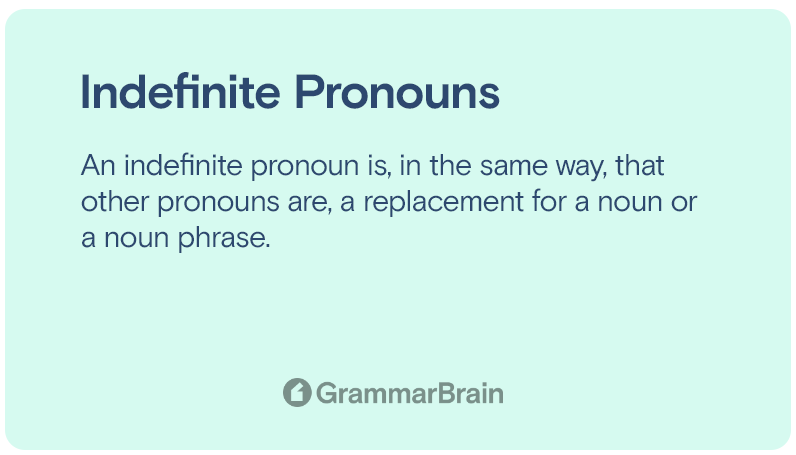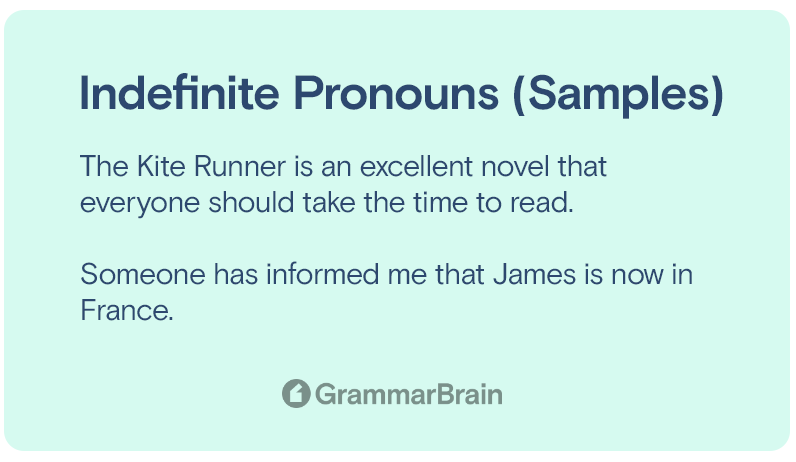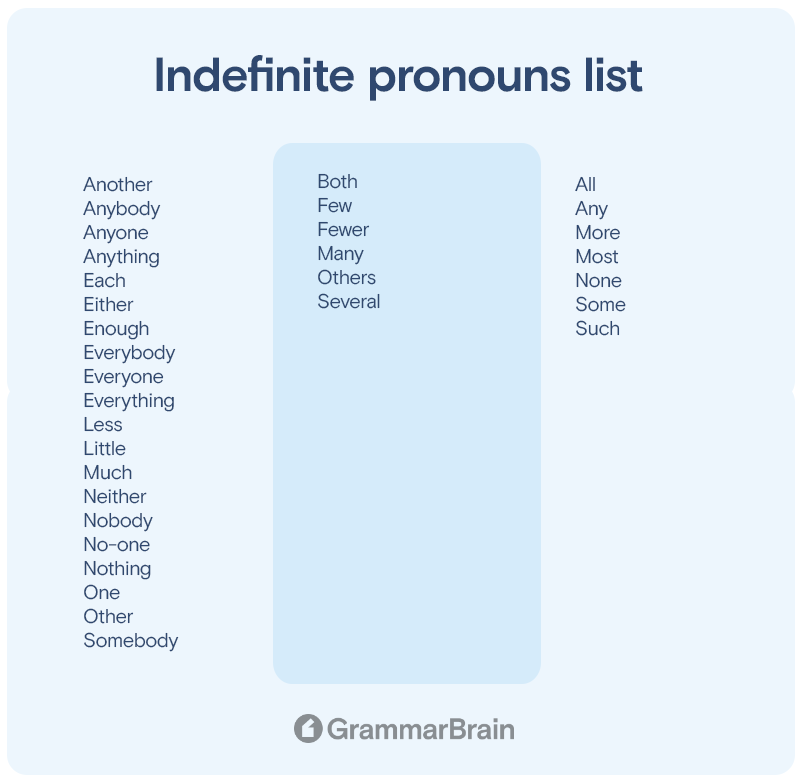What are indefinite pronouns? Indefinite pronouns can refer to one or more things, creatures, or locations that are not specifically named.
They are referred to as “indefinite” due to the fact that they do not specifically identify the thing, being, or location to which they are referring.

Indefinite pronoun – Simple definition
An indefinite pronoun is, in the same way, that other pronouns are, a replacement for a noun or a noun phrase.
The pronouns anyone, nobody, everybody, somebody, someone, everyone, each, anyone, anyone, all, none, some, and someone are the most frequently used indefinite pronouns.
Examples of indefinite pronouns
The following is a list of some examples of indefinite pronouns (underlined):
- The Kite Runner is an excellent novel that everyone should take the time to read.
- Someone has informed me that James is now in France.
- Everything appears to be hilarious until it really occurs to you.
- I don’t know anything about creative writing.
- Everyone agrees that she has the potential to become the next music prodigy.
How are indefinite pronouns and indefinite adjectives dissimilar from one another?
An indefinite adjective is one that may be used as an adjective in a variety of contexts and includes words such as all, any, anybody, etc.
To further assist you in comprehending the distinction between the two, the following examples are provided:
- All in the waiting room must be patient.
Here, ‘all’ is an indefinite pronoun.
- All patients in the waiting room must remain patient.
Here, ‘all’ is an indefinite adjective. It modifies ‘patients.’
- Please give some to Mrs. Johnson.
Here, ‘some’ is an indefinite pronoun.
- Please give some curry to Mrs. Johnson.
Here, ‘some’ is an indefinite adjective. It modifies ‘curry.’

Are indefinite pronouns singular or plural?
Some indefinite pronouns can only ever take the single form, while others can only take the plural form. There are yet others that can take either form at any time depending on the surrounding text or context.
Examples of Singular Indefinite Pronouns
- I will give money to anybody but you.
- I do not know anything about the affair.
- Everything has been taken care of.
- I know little about the situation.
Examples of Plural Indefinite Pronouns
- Few are chosen for the competition.
- Many are called to take part in the competition.
What are “variable indefinite pronouns”?
Depending on the noun that is being discussed, the variable indefinite pronouns can be used in conjunction with either a plural or a single form of the verb.
If you can count the thing that is being talked about, then you can use a plural verb.
Here are a few instances –
- Most people are going to the countryside for their vacation.
- Some wood blocks are left behind by the worker.
How do you utilize pronouns that are not definitive?
Indefinite pronouns, just like every other type of pronoun, may only ever be used in the same contexts as nouns.
This indicates that indefinite pronouns are capable of performing either the role of the subject or the object in a given phrase.
Subject – No one can give a definite answer.
Object – James was telling the story to someone over the phone.
On the other hand, the majority of words that are employed in the role of indefinite pronouns are also capable of functioning in other parts of speech.
If a word is being used as a modifier, it could be more accurately categorized as an adjective or an adverb.
Pronoun – Some of Bill’s friends attended the party last night.
Adjective – James found some loose coins in the subway.
Adverb – Some 600 people were present at the wedding ceremony.
Proper usage of indefinite pronouns
When working with indefinite pronouns, the most important thing to watch out for is ensuring that they have a correct subject-verb agreement.
When a singular meaning is assigned to an indefinite pronoun, the accompanying verb must also be singular. Also, if a pronoun is to be considered plural, the accompanying verb must also be plural.
Correct – One of us was narrating the story.
Incorrect – One of us were narrating the story.
Correct – Both of my cousins have long hair.
Incorrect – Both of my cousins has long hair.
When it comes to indefinite pronouns, which can be either singular or plural depending on the situation, things start to become a little more complicated.
Try to determine what the pronoun is referring to in order to determine if it is singular or plural. If it is referring to a singular noun, then you should use a singular verb.
If it is referring to more than one noun, then you should use multiple verbs. Always use the plural form of the verb when referring to something that has more than one noun.
Singular – Most of the book is of the romantic genre.
Plural – Most of the books are old.

Indefinite pronouns with collective nouns
You need to be on the lookout for collective nouns. They are nouns that refer to a group of individuals or objects as a single entity when used collectively.
Use a singular noun when referring to an entire group as if it were a cohesive entity, which requires the use of a collective noun.
Use a plural noun when the collective noun is being used to refer to the members of the group in their individual capacities.
Singular – Some of the team is going to be late.
Plural – Some of the team are practicing for the upcoming event.
| Singular Indefinite Pronouns | Plural Indefinite Pronouns | Indefinite Pronouns That Can be Singular or Plural |
| Another Anybody Anyone Anything Each Either Enough Everybody Everyone Everything Less Little Much Neither Nobody No-one Nothing One Other Somebody Someone Something | Both Few Fewer Many Others Several | All Any More Most None Some Such |
FAQs
1. What do you mean by the term “indefinite pronouns”?
An indefinite pronoun does not relate to something or someone in particular.
2. What are some common applications of indefinite pronouns?
When we wish to communicate about something or someone but not be explicit about who or what we are talking about, we use pronouns that are indefinite.
3. How to correctly use pronouns that are indefinite?
Indefinite pronouns are any pronouns that do not precisely identify a singular noun or a plural noun. This can include both singular and plural pronouns.
4. Which kind of pronouns are considered to be indefinite?
Indefinite pronouns are any pronouns that do not precisely identify a singular noun or a plural noun. This can include both singular and plural pronouns.
Sources
- Indefinite pronouns
- Indefinite Pronouns – Learn English Grammar
- What Is An Indefinite Pronoun? Definition And Examples
- Indefinite Pronouns
- What are the different types of indefinite pronouns?
- What Is an Indefinite Pronoun?
- INDEFINITE PRONOUNS
- Indefinite Pronouns
- What Are Indefinite Pronouns? (with Examples)
Inside this article
Fact checked:
Content is rigorously reviewed by a team of qualified and experienced fact checkers. Fact checkers review articles for factual accuracy, relevance, and timeliness. Learn more.
Core lessons
Glossary
- Abstract Noun
- Accusative Case
- Anecdote
- Antonym
- Active Sentence
- Adverb
- Adjective
- Allegory
- Alliteration
- Adjective Clause
- Adjective Phrase
- Ampersand
- Anastrophe
- Adverbial Clause
- Appositive Phrase
- Clause
- Compound Adjective
- Complex Sentence
- Compound Words
- Compound Predicate
- Common Noun
- Comparative Adjective
- Comparative and Superlative
- Compound Noun
- Compound Subject
- Compound Sentence
- Copular Verb
- Collective Noun
- Colloquialism
- Conciseness
- Consonance
- Conditional
- Concrete Noun
- Conjunction
- Conjugation
- Conditional Sentence
- Comma Splice
- Correlative Conjunction
- Coordinating Conjunction
- Coordinate Adjective
- Cumulative Adjective
- Dative Case
- Determiner
- Declarative Sentence
- Declarative Statement
- Direct Object Pronoun
- Direct Object
- Diction
- Diphthong
- Dangling Modifier
- Demonstrative Pronoun
- Demonstrative Adjective
- Direct Characterization
- Definite Article
- Doublespeak
- False Dilemma Fallacy
- Future Perfect Progressive
- Future Simple
- Future Perfect Continuous
- Future Perfect
- First Conditional
- Irregular Adjective
- Irregular Verb
- Imperative Sentence
- Indefinite Article
- Intransitive Verb
- Introductory Phrase
- Indefinite Pronoun
- Indirect Characterization
- Interrogative Sentence
- Intensive Pronoun
- Inanimate Object
- Indefinite Tense
- Infinitive Phrase
- Interjection
- Intensifier
- Infinitive
- Indicative Mood
- Participle
- Parallelism
- Prepositional Phrase
- Past Simple Tense
- Past Continuous Tense
- Past Perfect Tense
- Past Progressive Tense
- Present Simple Tense
- Present Perfect Tense
- Personal Pronoun
- Personification
- Persuasive Writing
- Parallel Structure
- Phrasal Verb
- Predicate Adjective
- Predicate Nominative
- Phonetic Language
- Plural Noun
- Punctuation
- Punctuation Marks
- Preposition
- Preposition of Place
- Parts of Speech
- Possessive Adjective
- Possessive Determiner
- Possessive Case
- Possessive Noun
- Proper Adjective
- Proper Noun
- Present Participle
- Prefix
- Predicate



